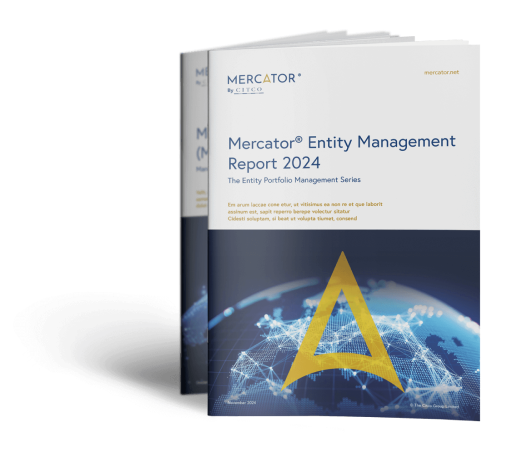The information contained in this document is marketing material and for informational purposes only. The information contained in this document is presented without any warranty or representation as to its accuracy or completeness and all implied representations or warranties of any kind are hereby disclaimed. Recipients of this document, whether clients or otherwise, should not act or refrain from acting on the basis of any information included in this document without seeking appropriate professional advice. The provision of the information contained in this document does not establish any express or implied duty or obligation between Citco and any recipient and neither Citco nor any of its shareholders, members, directors, principals or personnel shall be responsible or liable for results arising from the use or reliance of the information contained in this document including, without limitation, any loss (whether direct, indirect, in contract, tort or otherwise) arising from any decision made or action taken by any party in reliance upon the information contained in this document. © The Citco Group Limited, December 2024.
Understanding Ultimate Beneficial Ownership: Why it Matters for Multinationals
The global financial landscape has fundamentally shifted in the past decade, placing Ultimate Beneficial Ownership (UBO) at the forefront of corporate governance and regulatory compliance. Since the Panama Papers revelation in 2016, over 100 jurisdictions have strengthened their UBO regulations, transforming what was once a simple ownership disclosure requirement into a complex web of compliance obligations.
Despite not being the primary targets of UBO legislation, the stakes have never been higher for multinational corporations. With million-dollar penalties and potential criminal implications for non-compliance, understanding and navigating UBO requirements has become a strategic imperative rather than just a compliance exercise.
Understanding UBO Fundamentals
A UBO is the person or persons who ultimately control or own a company. While this definition seems straightforward, it varies significantly across jurisdictions, with ownership thresholds typically ranging between 10-25%. However, ownership percentages tell only part of the story. Many jurisdictions also recognize that control can be exercised through various means beyond direct shareholding, such as by voting rights and board appointment rights.
With more than 100 countries now maintaining distinct UBO definitions and regulations, multinational organizations must navigate an intricate web of compliance requirements, reporting obligations, and verification standards.
Challenges for Multinational Companies
Multinational companies must navigate multiple regulatory frameworks simultaneously, each with its own specific requirements and deadlines. The complexity increases as companies operate across borders, dealing with various documentation requirements and information-sharing protocols. Many organizations struggle with interpreting country-specific definitions while maintaining consistent compliance across their global operations.
The consequences of non-compliance are severe and far-reaching. Organizations face financial penalties that can exceed USD 1 million in countries like Germany and Luxembourg. Beyond monetary implications, companies risk criminal prosecution, exclusion from public tenders, and significant reputational damage that can lead to lost business opportunities.
The Strategic Importance of UBO Compliance
Understanding Ultimate Beneficial Ownership has evolved from a regulatory checkbox to a cornerstone of corporate risk management and business strategy. In the present-day business environment, knowing the true identity of business partners and clients is fundamental to protecting corporate interests and maintaining market integrity.
Effective UBO compliance serves multiple strategic functions. First, it acts as a critical defence mechanism against financial crimes by helping organizations identify and prevent potential money laundering schemes and fraudulent activities before they materialize. Second, it enables informed decision-making in business partnerships and investments by providing clarity on ownership structures and potential conflicts of interest. Third, it safeguards corporate reputation by ensuring transparency in business relationships and demonstrating commitment to regulatory compliance.
The business impact of UBO compliance also extends beyond risk mitigation. Forward-thinking organizations are transforming their UBO compliance programs into strategic advantages. In fact, in certain instances, companies will be prohibited from participating in public tenders or high-profile contracts if they cannot demonstrate a robust UBO compliance framework.
To measure and improve their UBO compliance effectiveness, organizations are implementing UBO-related performance metrics. These include monitoring the accuracy and timeliness of UBO verifications, tracking the resolution time for red flags, and measuring the completion rates of UBO-related due diligence. Such metrics not only help organizations gauge their compliance effectiveness but also demonstrate their commitment to corporate governance to stakeholders and regulators alike.
Global Compliance Landscape
Mercator’s recent analysis of global UBO compliance reveals a striking digital divide in regulatory frameworks. Countries that have embraced technological innovation demonstrate significantly higher compliance efficiency and reduced administrative burden. The United Kingdom and Luxembourg lead this digital transformation, having implemented tech driven processes and electronic filing systems that streamline reporting requirements and reduce compliance costs.
However, a significant portion of the global market still relies on traditional, paper-based processes. Nations such as Brazil, Colombia, and the United Arab Emirates maintain complex regulatory requirements that include manual documentation, in-person submissions, certified translations, and legal authentications. These requirements can extend compliance timelines and substantially increase costs for multinational organizations.
This disparity in regulatory approaches creates particular challenges for global organizations, which must navigate both streamlined digital systems and complex manual processes simultaneously.
Conclusion
As UBO regulations continue to expand and evolve, organizations must prioritize compliance through systematic approaches and technological solutions. The investment in proper UBO management processes is not merely a regulatory requirement but a crucial element for risk mitigation and business success in today’s regulatory environment.
Companies that establish robust UBO compliance programs will be better positioned to navigate the evolving regulatory landscape while maintaining their competitive edge in the global marketplace.
Kariem Abdellatif
Head of Mercator by Citco, Citco C&T Holdings (Luxembourg) S.à.r.l
Best Practices for UBO Compliance
1. Know the rules: Understand country-specific regulations and stay updated on changes
2. File on time: Meet all deadlines for UBO reporting. The risks of non-compliance are too great to not to prioritize.
3. Maintain internal registers: Keep UBO information readily available and up to date, even if not legally obligated

